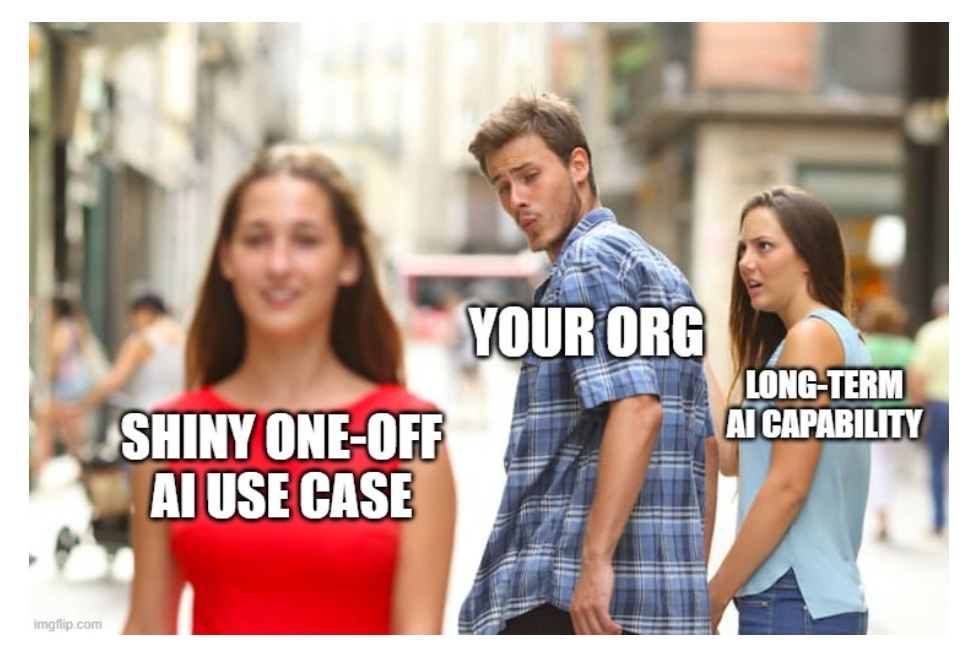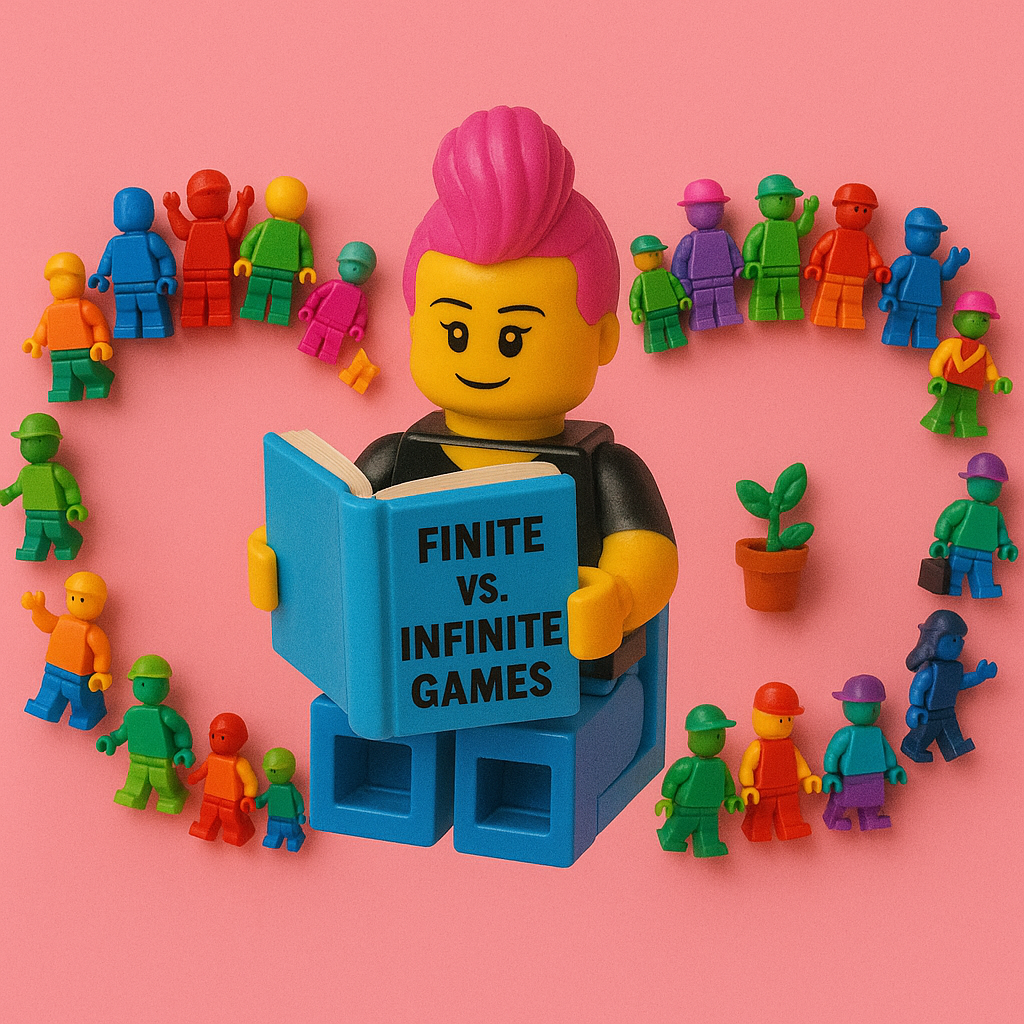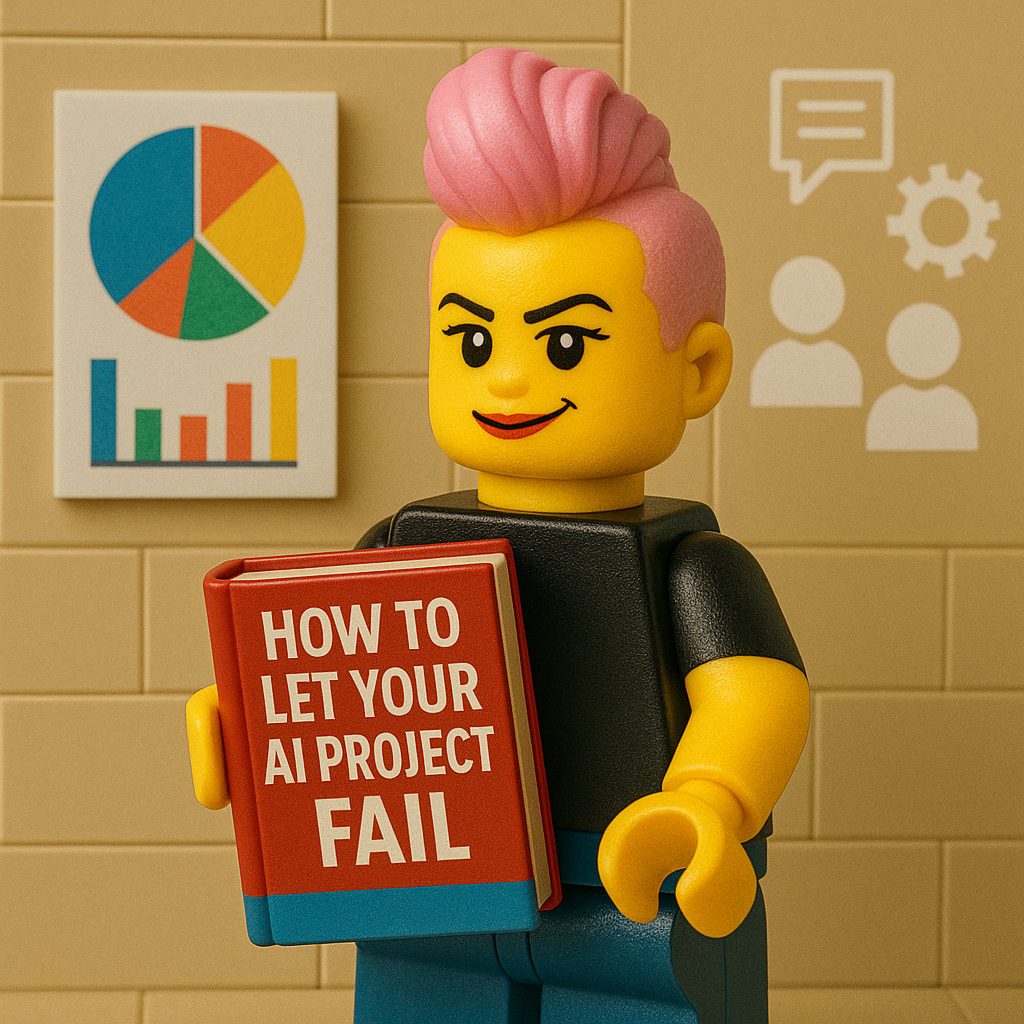AI as a finite vs infinite game in organizations
Most organizations are asking the wrong question about AI.
They’re asking: How do we win with AI? What they should be asking is: How do we keep playing?
The difference is subtle, but transformative. It’s the difference between approaching AI as a finite game or an infinite game. Simon Sinek popularized this distinction (originally developed by James P. Carse), and it offers a fresh, much-needed lens on how to lead AI adoption. (So now you know what’s on my nightstand :-))
Finite games vs infinite games
A finite game has fixed rules, known players, and a clear endpoint. Football is a finite game. So is a sales competition. In business, finite games are things like launching a product, completing a project, or winning market share in a specific quarter.
An infinite game has known and unknown players, changing rules, and no fixed endpoint. The goal isn’t to win, it’s to keep playing, to keep evolving. Relationships are infinite. So is learning. So is the long-term health of your organization.
Now let’s apply this to AI.
The finite game of AI: short-term wins, long-term waste
When companies adopt AI with a finite mindset, they’re thinking like this:
- We need to show ROI in the next 6 months
- Let’s automate something to cut costs fast
- Let’s buy a tool and be seen as an AI-first company
This is the AI equivalent of trying to win a sprint when the race never ends. These companies launch a chatbot or predictive model, then stop improving it, they fail to build internal capabilities (so they stay dependent on consulting firms), they focus on tools, not data foundations and they treat AI as a tech implementation project, not a capability or culture shift.
Let me give you an example: A retail chain installs AI-powered cameras to detect shoplifting. They deploy fast, announce success, and move on. Six months later, false positives spike; staff don’t trust it; customers complain. The team has moved on to the next tech project. The AI system is abandoned or quietly switched off.
That’s a finite game result:
Project delivered, headline grabbed, but no sustained value 💀
The infinite game of AI: capability over completion
Organizations playing the infinite game think differently:
- AI is a journey, not a deliverable
- We need to build literacy, governance, and ethical capacity
- Let’s focus on value creation over time, not one-off wins
This mindset leads to very different decisions. They start small but keep improving (e.g., one use case, continuously refined), they invest in data quality and cross-functional teams, they Align AI initiatives with long-term business goals, not quarterly targets and they create systems to learn from feedback; human and machine.
Also here I’d like to give you an example: A logistics company starts with a small route optimization model. It doesn’t save much money at first. But over 18 months, they improve their data quality, retrain staff, and integrate feedback from drivers. AI becomes part of how they think about operations. They begin experimenting with predictive maintenance and inventory forecasting. There is no big “launch”, just steady evolution.
That’s the infinite game at work: resilience, trust, and adaptability built over time.
5 Signs your AI strategy is playing a finite game
- No long-term plan for AI talent development
- Success measured only by ROI in months
- Projects that launch but don’t evolve
- AI decisions made in isolation from business strategy
- Ethical risks treated as an afterthought

5 Signs you’re playing the infinite game
- You’re building AI literacy across the organization
- You have a data governance strategy aligned to AI goals
- Your AI roadmap is flexible and revisited regularly
- You learn from failures and adjust course
- You’re measuring cultural and capability shifts—not just outcomes
Why this matters now
AI isn’t a tool you finish installing. It’s a capability you build and grow with. The rules will keep changing. New models will emerge. Regulations will evolve. Expectations from customers, employees, and the public will shift. If your mindset is fixed, your AI strategy will snap under pressure. But if your mindset is adaptive and designed to keep playing, you’ll build trust, innovation, and real value over time. This isn’t just about being more responsible, but about being more resilient.
AI is not a game to win. It’s a game to stay in.
Are you building to keep playing?
You May Also Like
How to let your AI project fail in spectacular fashion!
From 137 use cases in an Excel file to an AI chatbot no one asked for—this satirical guide explores the real reasons AI projects fail inside organizations. It’s not the tech; it’s the thinking.
Still stuck in Permit A38? Stop AI-ing the wrong things
Organizations rushing into AI often automate bad processes instead of fixing them. This piece unpacks how to break free from the 'Permit A38' trap by rethinking culture, streamlining collaboration, …
Unmeasured Part 5 – Rethinking productivity for a human future
In Part 5 of the Unmeasured series, we move beyond productivity theater and vanity metrics. Discover how to build systems that prioritize what truly matters: impact, sustainability, creativity, and …





